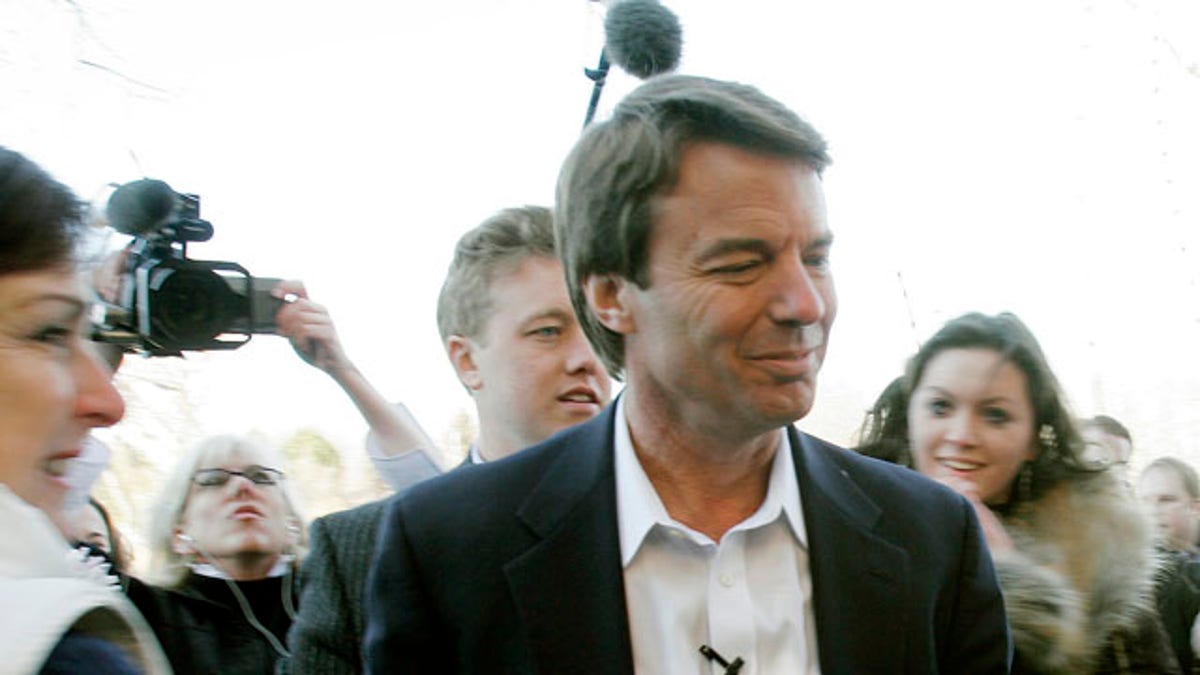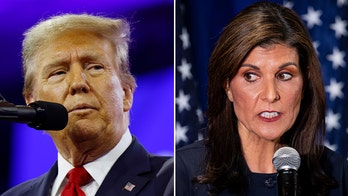
FILE: In this 2006 picture, Rielle Hunter, background left, holds a video camera as former North Carolina Sen. John Edwards campaigns in Portsmouth, N.H. A federal criminal investigation is examining how much the two-time presidential candidate knew about money used to cover up his extramarital affair and illegitimate child with Hunter.
GREENSBORO, N.C. – Defense lawyers for John Edwards will argue at his trial that much of the nearly $1 million in secret payments at issue in the criminal case against their client were actually siphoned off by a trusted aide to build an expansive dream home.
The former aide, Andrew Young, is potentially the prosecution's most important witness: He was once so loyal to Edwards he falsely claimed paternity of the baby fathered by his married boss in an attempt to avoid a sex scandal.
Young's testimony, along with a cache of voicemails he received from Edwards, will be vital to making the government's case that the North Carolina Democrat masterminded the effort to hide his pregnant mistress as he sought the White House in 2008.
Destroying Young's credibility with the jury, therefore, will be essential for the defense team's strategy to keep their client out of prison. Opening arguments are set for Monday, with the trial expected to last at least six weeks.
Edwards, 58, has pleaded not guilty to six criminal counts related to campaign finance violations. The indictment filed by the U.S. Justice Department last year recounts more than $933,000 in unreported payments from two campaign donors who had already given the maximum contributions allowed by law.
Edwards denies knowing about the money. Defense attorneys say even if he did, the payments don't fit the legal definition of political contributions because they were not meant to influence the election. Instead, they say, the payments were gifts meant to hide Edwards' affair from his wife, not voters.
The bulk of the cash was provided by Rachel "Bunny" Mellon, a 101-year-old heiress who lives on a secluded Virginia estate so massive it contains a landing strip for her private jet. A friend of former First Lady Jacqueline Kennedy, prosecutors say Mellon offered under-the-table cash to cover Edwards' personal expenses after the candidate was embarrassed by media reports that campaign funds were used to pay for $400 haircuts.
"From now on, all haircuts, etc., that are necessary and important for his campaign, please send the bills to me," Mellon wrote to Young in April 2007.
The following month, Edwards' mistress, Rielle Hunter, informed the candidate she was pregnant. According to the account in Young's 2010 tell-all book about the affair, Edwards was unable to access his own money to support Hunter without his wife, Elizabeth, finding out.
So, Young says, Edwards decided to take Mellon up on her offer.
"Edwards called her, and the 'Bunny money' began to flow," Young wrote in his book, "The Politician."
In the following months, Mellon sent $750,000 in checks for Edwards through her interior designer in Charlotte. Young wrote that he deposited the checks in a joint bank account controlled by him and his wife, Cheri.
At the time, the couple was starting construction on a four-bedroom "dream house" on a wooded hilltop near Chapel Hill. The home sits on a 10-acre lot and is valued at about $1.3 million.
Both prosecutors and defense lawyers declined interview requests. But hundreds of pages of court documents and hours of oral arguments in recent months offer insights into their likely strategies for the trial.
Edwards also recently added two Greensboro lawyers to his team who represented Hunter in her two-year legal fight over ownership of a sex tape she recorded with Edwards in 2007. The civil case ended with a settlement requiring all copies of the intimate video to be destroyed, and the Youngs still face contempt of court charges stemming from the case.
Lawyers for the Youngs could not be reached for comment.
In an April 11 brief, Edwards' team declared their intent to prove during the criminal trial that the Youngs converted much of the money from Mellon for personal use. Their list of trial exhibits includes copies of the Youngs' bank records and 13 bills from the contractor that built their home. That builder, Scott McLean, is also listed as a defense witness.
On Sept. 27, 2007, reporters from a tabloid tried to interview Hunter in New Jersey, where she was staying at the home of a friend. According to Young, Edwards called and asked if his pregnant mistress could come and stay with the Youngs in the Chatham County mansion they had rented while their home was being built. Located in a gated community, Edwards suggested the Youngs' house might provide better security from those seeking to expose his affair.
Weeks later, the tabloid reporters trailed Hunter to North Carolina. The Youngs accompanied the mistress as they fled, beginning a cross-country odyssey of travel on private jets and stays in luxury hotels. While they were on the run, the federal indictment alleges that more than $183,000 in bills related to Hunter's care was paid by Fred Baron, a wealthy Texas lawyer who served as Edwards' campaign finance director. Baron has since died.
Of the "Bunny money," $375,000 was received by the Youngs before Hunter's September 2007 arrival in Chapel Hill, according to the indictment.
"There is no doubt that the payments by Ms. Mellon and Mr. Baron covered Ms. Hunter's personal expenses (and, much more so, the Youngs' personal expenses, such as construction of their dream home) — not Mr. Edwards' expenses," the defense lawyers wrote.




